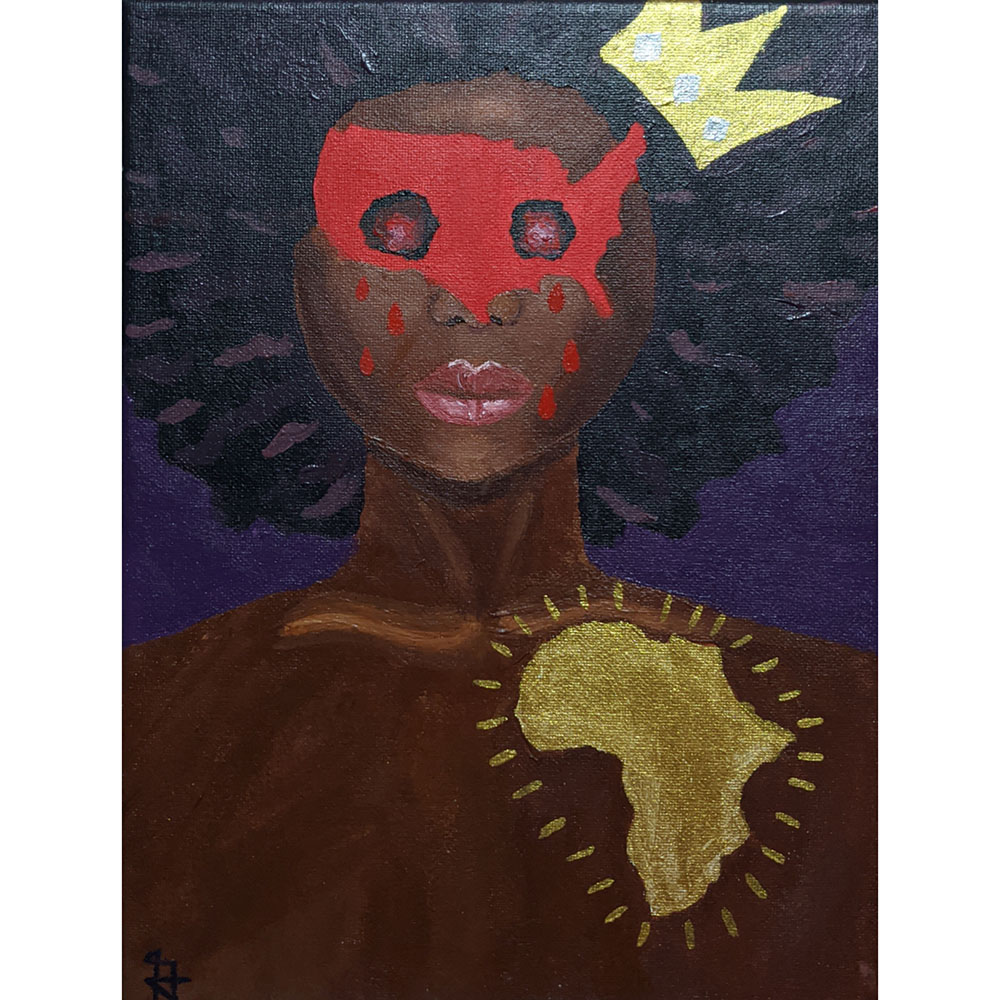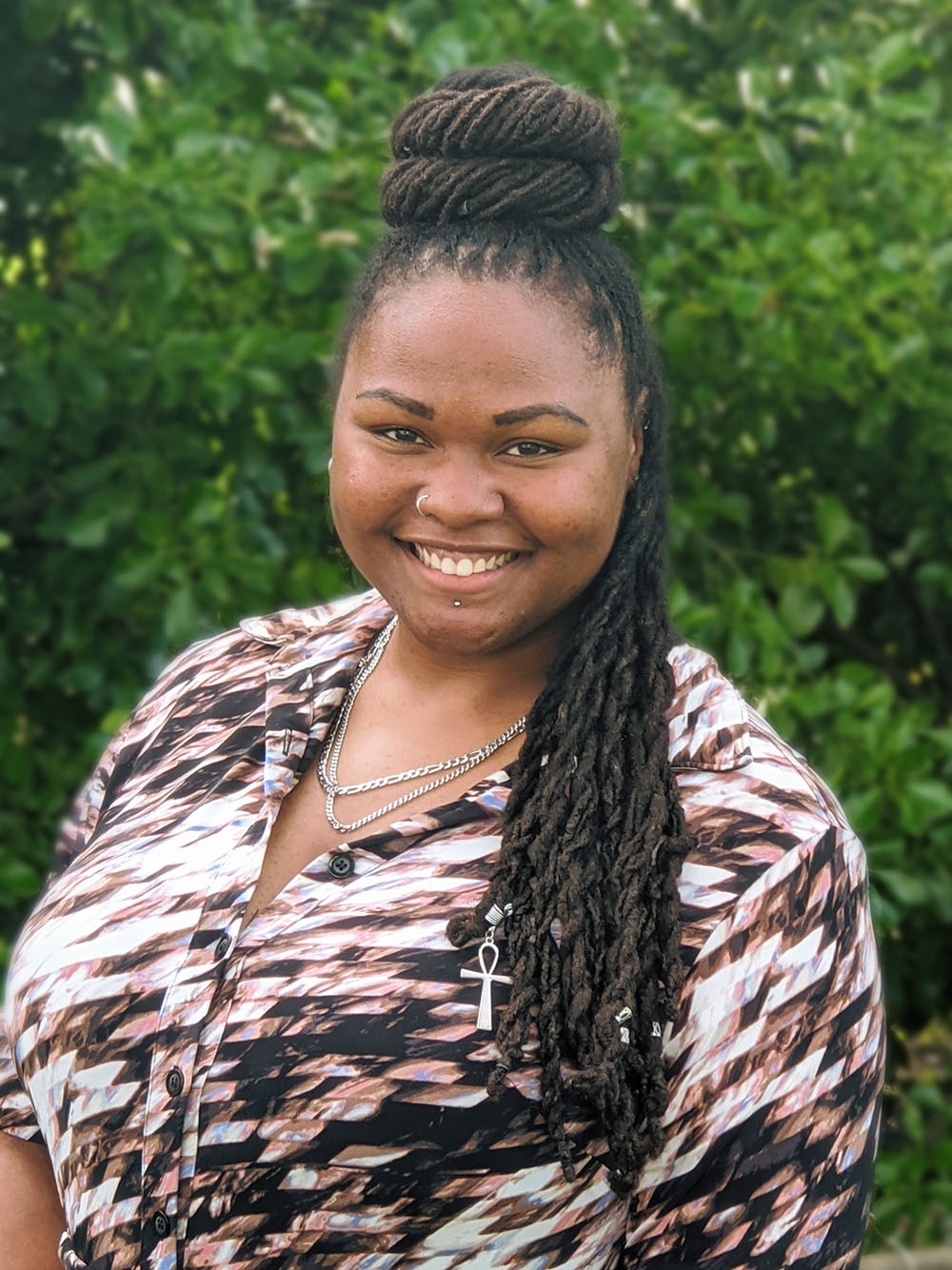June 30, 2020 | Gabrielle Cooper
With hundreds of Pride celebrations around the world canceled or postponed due to COVID-19, or reimagined with Black Lives Matter protests, this Pride Month has certainly been historic. We asked Gabrielle Cooper, a graduate student in the Counseling and Art Therapy program at Ursuline College, to share what’s on her mind this Pride Month and as she prepares to begin her career as an art therapist.
Why did you decide to pursue a career in art therapy? Is there a client group in particular you are interested in working with?
Art has been a part of my life since I can remember. I used to draw on the walls of our home with crayon when I was two. I would do it all over again after my mom made me clean it off! She helped foster my creativity. I created art throughout my entire childhood and adolescence. I was researching what majors to pursue in college when I was 16 and I discovered art therapy. The profession combines my passions of art with helping others with their struggles in a way that promotes holistic wellness. The populations I wish to work with are the Black community, the LGBTQIA+ community, youth, and individuals with these intersecting identities.
What do you see as your role in working with the LGBTQIA+ and Black communities as an art therapist?
I want the communities to know that I am an advocate, listener, and confidant in my professional role as an art therapist and as a person in general. It is my duty to stay current with laws regarding transgender individuals, frequently occurring race related injustices, defend the communities, and educate people when I feel comfortable and deem necessary. It is my role to know what issues the communities face so I can know how to best help them. As an art therapist, my role is to educate those in the communities about healthy outlets for expression and feelings such as art, mental wellness and ways to achieve optimal living, and how to find resources, support, and other community members.
Is art therapy uniquely suited, compared to other therapies including talk therapy, in working with LGBTQIA communities? Why?
Art therapy is better for many communities, the LGBTQIA+ community being one of them. LGBTQIA+ people are much more likely than their heterosexual counterparts to attempt and complete suicide. Due to this, many people in the community have tried themselves or know someone who has attempted or completed suicide. Trans women of color are murdered without there being media coverage or proper investigations. Grief often plagues this community which is why it is so important to celebrate wins and find joy. Suicidal ideations and history can be hard for people to discuss and there are rarely words to accurately describe grief. Art therapy is great for this because it gives clients an outlet to express these feelings without fear of the possibility of a judgmental face, awkward silence, or stare after revealing this personal information. Creating art takes the focus off having the perfect things to say and puts it on the creative process. Art therapy can give people the freedom to explore their sexuality without feeling the need to commit to labels by using their imagination to make art. With the help of a qualified and competent art therapist, they may discover unconscious sexual desires from what they create which could be a pivotal moment in their life.
How does art influence or inspire activism? Are you seeing examples in this moment?
Art allows people to receive a message without necessarily knowing who the message came from. When people view it, they are consuming that message without the bias or judgement that may come from physically seeing someone speaking. Because art evokes emotion, it gives artists unlimited ways to convey a message. In activist art, art is made to inform people of social justice and political issues as well as call them to action. Citizens can avoid the news, articles, social media, and the whole Black Lives Matter movement if they try hard enough, but they can’t avoid a giant mural of a Black person who was murdered on a board in the window of their favorite brunch restaurant. In this movement, art is screaming to people, “Hey! Look! This is happening in your city, in your country, under your nose! Pay attention and do something about it!”
Have recent events inspired you? What advice do you give others who want to get involved or stay engaged in social justice?
Recent events have inspired me to speak my mind more often. Before, I would battle with holding my tongue in fear of being labeled the angry Black woman. Now, I dismiss that thought and speak my mind when I have the emotional capacity. I would tell people to not constantly rely on Black people to educate them on what is happening or their experiences. There are books and articles with a wealth of information that do not require the unpaid emotional labor of a Black person. Know that it is a constant fight to end social injustice. Know that there are roles for everyone in this movement and that protesting may or may not be for you. Change can occur in a simple conversation with a loved one about injustice and the realities of Black Americans. Don’t give up because you don’t see major change happening before your eyes.
What does Pride Month mean to you?
It is truly a radical time to answer this because of the protests and how Pride month began. Pride month started as a riot because police would often raid bars in NYC that were safe havens for LGBTQIA+ individuals, particularly those of color, like trans women Marsha P. Johnson and Sylvia Rivera who were pioneers in the movement. Pride month would not exist without the sacrifices and courage of black and brown trans women to live their truth. To me, Pride month is a time to celebrate our LGBTQIA+ identities and how far we have come, but most importantly honor those in the community who came before us in this movement toward equity, justice, and human rights.
What are some effective ways for people to support the LGBTQIA communities right now? And how can we personally support our LGBTQIA friends during these times?
If you choose to celebrate Pride month, do so knowing the history and what exactly it is you are celebrating. It is never too late to learn something new. You can support the communities and your friends by being an ally which means speaking up in their absence when negative or derogatory things are being said, having the courage to correct people in your circle, and normalize asking people their pronouns. Donate to small, legitimate organizations run by LGBTQIA+ people that need funding to grow and continue operating. Most importantly, if you want to support the LGBTQIA+ community, you must support and protect the most marginalized like Black trans women. By centering their voices, experiences, and needs, you will be uplifting the entire community.
Is there anything else you’d like to share?
As art therapists, it is our duty to stay up to date on social issues and how they affect our clients. Black people, LGBTQIA+ people, and those with intersecting identities are especially traumatized by the videos and knowledge of the what is continuing to happen in America today. Right now is a perfect time for art therapists to show how much we care and support this movement by centering the voices of the most marginalized, evaluating our personal biases, and advocating for our clients.

“Brainwashed” by Gabrielle Cooper. Acrylic Paint. June 8, 2020.
Gabrielle Cooper, BS
 Gabrielle Cooper (she/her/hers) is an Ohio born and raised graduate student in the Counseling and Art Therapy program at Ursuline College. After graduating in December 2021, she plans to return to Columbus to practice trauma-informed care. She graduated from Kent State University with a Bachelor of Science in Human Development and Family Studies with a concentration in Child and Youth Development and a Fine Arts Minor. She is the current President of the Chi Alpha Theta Chapter of the International Counseling Honor Society Chi Sigma Iota. Gabrielle was awarded the Don Jones Memorial Scholarship to attend the 2019 Buckeye Art Therapy Association Symposium. At Kent State University, she was the recipient of the 2016 Undergraduate Student Inclusive Influence Award, 2016 Student Leader of the Year Award, and 2017 Out and Proud Student Leader Award.
Gabrielle Cooper (she/her/hers) is an Ohio born and raised graduate student in the Counseling and Art Therapy program at Ursuline College. After graduating in December 2021, she plans to return to Columbus to practice trauma-informed care. She graduated from Kent State University with a Bachelor of Science in Human Development and Family Studies with a concentration in Child and Youth Development and a Fine Arts Minor. She is the current President of the Chi Alpha Theta Chapter of the International Counseling Honor Society Chi Sigma Iota. Gabrielle was awarded the Don Jones Memorial Scholarship to attend the 2019 Buckeye Art Therapy Association Symposium. At Kent State University, she was the recipient of the 2016 Undergraduate Student Inclusive Influence Award, 2016 Student Leader of the Year Award, and 2017 Out and Proud Student Leader Award.
Her essential roles in LGBTQIA+ organizations as well as being the founder of an LGBTQIA+ student organization for people of color, gained her recognition amongst the Kent State community. While working as an intern for NAMI Summit County, she assisted in making major decisions regarding mental health issues and policies. In addition to art, music has played an integral role in her life. She has recently included meditation in her morning routine and views being authentic as self-care. Gabrielle strives to help people become more self-aware to increase life satisfaction.
